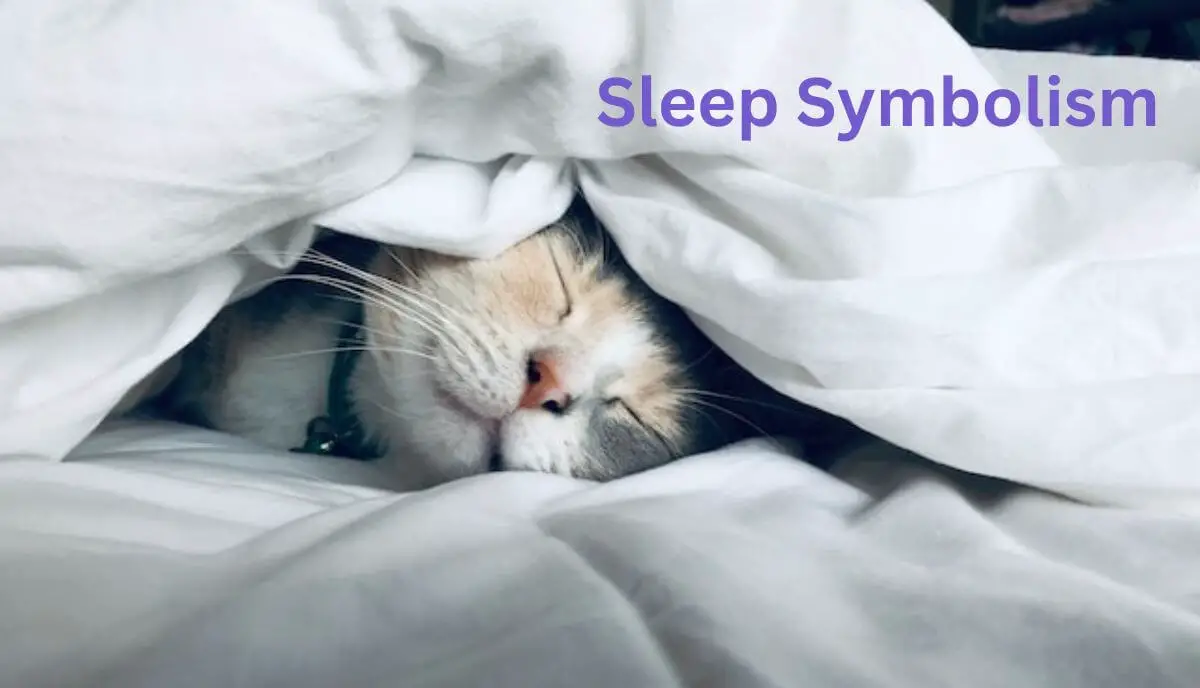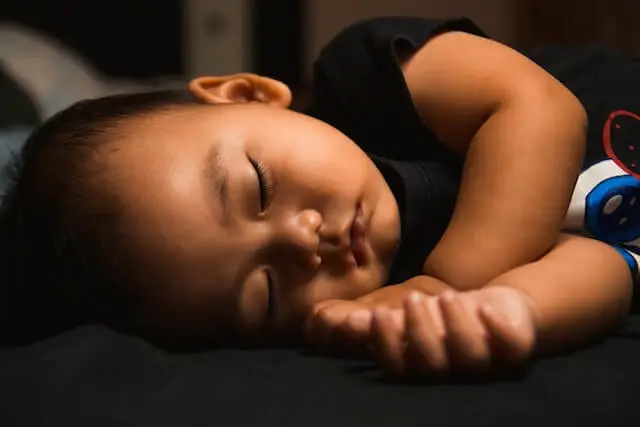Hey dreamers, dozers, and all you other marvelous slumber seekers! Let’s talk about something mysteriously enchanting: sleep symbolism.
That seemingly mundane, “I’ll just rest my eyes” thing we do where our brains decide to throw us into a wild, unpredictable world of imagery and emotion
Dive with me into the world of z’s and let’s decode these slumbertime riddles together. Grab your pillow, it’s going to be a wildly interesting ride.

Sleep Symbolism
Sleep as a Symbol of Innocence

You ever watch a kid sleep? Their face looks like it’s never known a worry in the world. Man, just watching someone snuggled up, lost in a dreamland where monsters get defeated and cake never runs out, reminds you of simpler times.
I remember sneaking into my nephew’s room to play the role of the ‘Tooth Fairy.’ There he was, utterly lost to the world, a small knight in starry pajamas. And for a moment, you think, “Darn, I miss feeling that light.”
Sleep strips us of our adult complexity. You’re not a manager, a parent, or a taxpayer when you’re asleep; you’re just a human being in their most natural and innocent state.
And in today’s world, where innocence seems like a rare gem, that’s something special. It’s like sleep serves as this little time capsule, transporting you back to a phase where life’s biggest question was what flavor of ice cream to choose.
Sleep as a Symbol of Rebirth

Sleep can also symbolize rebirth and new beginnings in your life. We all have one of those days that’s so rough, we can’t wait to “call it”? Like, life has just worn you down to the nub, and you think, “That’s it; I’m out.”
You finally collapse into bed and—get this—you wake up feeling like you’ve hit the refresh button on your entire existence. That’s sleep, your personal reboot system, wiping the slate clean from the day before.
I’m not talking about the scary, forever kind of “death,” mind you. I’m talking about the idea that when you’re asleep, you’re not active, not engaged—you’re paused.
I remember, after my first real breakup, I felt like part of me had died. But after finally getting a few good sleeps, it’s as if I’d resurrected a new, stronger version of myself.
Read Also: Lake Symbolism
Sleep as a Symbol of Death

On the other side of the spectrum, sleep has also been paralleled with death. It might seem morbid, but there’s a certain poetic beauty to it. Buddha himself once named sleep “the small death,” painting a vivid metaphor due to the deep stillness and the cease of conscious activity that both states share.
This comparison isn’t lost in the world of literature, where sleep and death intermingle in a dance of words, leading us to ponder the fine line between rest and the eternal sleep. Many authors and poets have long embraced this symbolism, casting sleep as the twin of death.
So in this light, sleep gives us a sneak peek into what death might be like, asking us to think about life’s temporary state. It’s like a daily reminder to value our time and wonder about life’s biggest mystery.
Sleep as a Symbol of Escape

For many people sleep represents an escape from everyday life. The clock hits bedtime, and boom—you’ve got your backstage pass to another world. Your own personal escape room, but instead of puzzles, it’s jam-packed with dreams, a place where the rules of reality don’t apply.
For me, whenever I’m stressed about looming deadlines, I actually look forward to sleep. Those eight-ish hours are my sanctuary, my mini-vacation from pressure and expectations.
But hey, while we’re on the topic, let’s get something straight: Sleep isn’t some miracle cure for life’s complexities. It might give you a breather from anxiety or that “restart feeling button” but more like a band-aid, not surgery.
Trust me, I’ve tried to sleep away problems before, and spoiler alert—they were still there when I woke up. It’s good for a time-out, not for time travel out of your issues.
Sleep as a Symbol of Rest and Rejuvenation

You ever think of sleep as your personal pit crew? You know, like in those speedy car races where the vehicle zooms into the pit stop and a team of experts fine-tunes it in a flash? Wait, what?
I know, it’s the best analogy, but something similar is happening in your body and mind every time you catch those Z’s. Imagine it—your cells repairing, your brain decluttering, and your emotions simmering down.
I remember cramming for my math exam until I was practically drooling on my textbook. The alarm buzzed at 6 AM, and I woke up more zombie than human.
The test? I could barely spell my name right. Then came another exam. This time, I gave myself the gift of 8 hours of sleep. It was as if my brain had turned into a supercomputer, recalling facts I’d forgotten I knew!
And it’s not just about acing exams or nailing presentations. Ever snap at someone and think, “Whoa, where did that come from?” I bet you were sleep-deprived. Lack of sleep messes with your mood faster than a toddler can dismantle a stack of blocks. But catch a good night’s rest, and you’re basically a walking Zen garden.
Sleep as a Symbol of Security

Let’s talk forts—remember building those as a kid? Blankets thrown over chairs, cushions lining the floor, and maybe a secret password to get in? Yeah, forts were the ultimate safe zones, our little headquarters away from imaginary dragons and real-life sibling invasions.
Well, guess what? That cozy bubble of safety didn’t disappear; it just evolved into your bed, your nightly fortress. Sleep isn’t merely rest—it’s your nightly security detail.
So why does hopping into bed make us feel like a baby wrapped in a swaddle? Probably because that’s where all our internal guards drop. I’ve felt it after long days when my thoughts were a tangled mess; hitting the pillow was like stepping into a safety vault. No alarms, no worries—just me wrapped in what felt like a bulletproof blanket.
So, wrap yourself in your modern-day fort tonight and relish in that luxurious feeling of security. It’s not just child’s play; it’s a fundamental human need. And there’s no shame in safeguarding it like the treasure it is.
Sleep as a Symbol of Purity

Sleep also symbolizes purity, as it is a time for the body and mind to rest and rejuvenate. In many cultures, sleep is seen as a way to cleanse the body and soul, allowing for a fresh start each day.
One way that sleep is seen as a symbol of purity is through the idea of a “clean slate.” When you go to sleep, you are essentially wiping the slate clean from the day before.
Ever wondered why we look younger, better, almost angelic after a deep sleep? Your body is hard at work detoxifying itself. It’s like taking your soul to a spa for a deep cleanse, scrubbing away the toxins and stress pimples.
But also that crystal-clear thinking. You know, when you go to bed overwhelmed by problems and wake up with a laundry list of solutions? That’s sleep, working its purity magic on your thoughts. I’ve solved more life issues between midnight and sunrise than I have in endless hours of pondering.
Sleep as a Symbol of Time Passage

Ever felt like you woke up in a whole new era after a good night’s sleep? That deep sleep that acts as a time machine. You close your eyes to the chirping crickets, and suddenly, you’re waking up to morning birdsong, like you’ve been fast-forwarded through the night.
It reminds me of a time when I spent two days partying without a minute of sleep. I eventually crashed, and when I woke up, it felt like I’d skipped a whole season of my favorite TV show.
While I slept, it seemed as though the world had moved on without me. Kinda makes you think, right? Time doesn’t slow down just because you’re off the clock.
Literary geniuses get this too. In novels and plays, sleep often becomes this miraculous fast-forward button. One moment, the hero is young and carefree; after a symbolic snooze, they wake up, and bam! Life has happened. They’ve grown older, wiser, or just plain different.
So, as you tuck yourself into bed tonight, consider this: you’re not just hitting the pause button on life; you’re fast-forwarding to tomorrow’s adventures. It’s like life’s way of telling you, “Stay tuned for the next exciting episode!” And honestly, I can’t wait to see what happens next.
Meanings and Symbolism of Sleep in Dreams
Inception, anyone? Yup, dreaming about sleep is a mind-bender. But as surreal as it seems, dreams within dreams offer a treasure trove of insights into our subconscious.
- Deep sleep
If you’re floating in a dream world of deep, uninterrupted sleep, consider it a sign from your inner self screaming for some R&R. Your brain could be putting up a “Do Not Disturb” sign, signaling the need for emotional detox or mental recharging. Basically, your mind’s way of saying, “Hey, I could use a break here!”
- Troubled sleep
Now, let’s say you’re in dreamland, but it’s a restless, tossing-and-turning kind of sleep. If your dream self can’t catch a break, it’s probably because your waking self is grappling with stress or knotty problems that just won’t untangle. Your subconscious is practically sending you an SOS to resolve these issues before they steal any more of your peace.
- Interrupted sleep
Ever dreamed that you’re struggling to sleep, interrupted every time you’re about to drift off? It’s like an annoying pop-up ad in your subconscious. Usually, it signifies restlessness or dissatisfaction in real life. You might feel like your path is littered with roadblocks or like you’re at a standstill.
- Sleepwalking
Dreaming that you’re sleepwalking? That’s your inner self commenting on auto-pilot mode. Maybe you’re making decisions without much thought or living out days that feel scripted. It’s like your brain is nudging you and asking, “Are we just going through the motions here?”
- Sleep paralysis
Then comes sleep paralysis, the stuff of nightmares. In a dream, this can point to feelings of entrapment or powerlessness. It’s like your mind is showing you a dramatic trailer for your fears, reminding you that you might need to confront what’s holding you back.
So, if you find yourself dreaming of sleep, don’t just shrug it off. Think of it as your subconscious sliding into your DMs, and it’s up to you to decode the message.